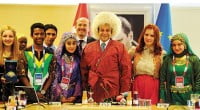National Security Council intended to arrest Fethullah Gülen in 1997

Date posted: September 10, 2012
2 September 2012 / TODAY’S ZAMAN, ISTANBUL
Meral Akşener, a Nationalist Movement Party (MHP) deputy and vice president of Parliament, who was interior minister at the time of the Feb. 28 coup, claimed that The National Security Council (MGK) actually discussed a total of 24 decisions, which included the recitation of the call to prayer in Turkish, the arrest of Turkish-Islamic scholar Fethullah Gülen, reducing the number of theology faculties and the closing down of imam-hatip (religious) schools. However, these four articles were not adopted.
The National Security Council decided during its latest meeting last week to remove the confidentiality designation of MGK documents in the run-up to the Feb. 28, 1997 military coup and send them to a parliamentary commission that investigates military interventions, media reports said on Sunday.
In its last meeting on Tuesday, MGK members agreed to send the documents of the controversial MGK meeting in 1997 which led to the resignation of a coalition government led by a conservative party.
Parliament’s Coup and Memorandum Investigation Commission’s sub-commission, which is investigating the Feb. 28 coup in particular, earlier requested relevant documents from the Presidency and the Prime Ministry.
The Turkish Armed Forces (TSK) issued a memorandum on Feb. 28, 1997, strongly criticizing the government led by the now-defunct Welfare Party (RP) and claimed that the government had failed to take necessary measures to fight what the army called “reactionaryism.” The MGK made a total of 18 decisions during a meeting on Feb. 28 and presented them to then-Prime Minister and RP leader Necmettin Erbakan for approval. Erbakan was forced to sign the decisions. He subsequently resigned, handing over the Prime Ministry to his coalition partner, Tansu Çiller.
The decisions taken at the MGK meeting on Feb. 28 and signed by Prime Minister Erbakan were interpreted by many at the time as military interference, thus inhibiting the basis for democracy. The Feb. 28 coup introduced a series of harsh restrictions on religious life, with an unofficial but widely practiced ban on the use of the Islamic headscarf. The military was purged of members with suspected ties to religious groups.
Meral Akşener, a Nationalist Movement Party (MHP) deputy and vice president of Parliament, who was interior minister at the time of the Feb. 28 coup, earlier claimed that the MGK actually discussed a total of 24 decisions, which included the recitation of the call to prayer in Turkish, the arrest of Turkish-Islamic scholar Fethullah Gülen, reducing the number of theology faculties and the closing down of imam-hatip (religious) schools. However, these four articles were not adopted.
The sub-commission will examine the 1997 MGK documents in an attempt to shed light on the Feb. 28 coup.
Source: Today’s Zaman http://www.todayszaman.com/news-291195-mgk-decides-to-declassify-controversial-1997-meeting.html
Tags: Fethullah Gulen | Military coups in Turkey | Turkey |
























